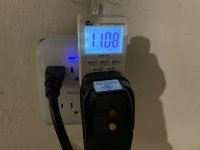Good Morning!!!! 89F @ 6:45AM. Sunny. Near record high temperatures. High near 110F. Winds NW at 5 to 10 mph.
80K sounds high for a batteryless system, Paul. Some things I've learned along the way:
- Each utility has its own policies for selling and buying power to solar equipped homes. Here, PG&E puts you on time-of-use rates with much higher prices for power during peak demand hours. They sell power at $.40/kWh, but only give me $.04/kWh for what I sell back to them. But that only goes at the yearly "true up", where each kWh I sell offsets each kWh I buy one-for-one, and the rates apply to any difference either way. For my circumstances, it makes no sense to generate more electricity with solar than I actually use, from a financial standpoint.
- Look at your power bills over the last few years and get a feeling for how much you actually use. That will help you size the solar array output. If your utility provides data for each hour of the day, see what time of day you're using power, and if a solar power system would provide most of that power or not. Consider shifting high power demand tasks like laundry or dish washing to times of peak solar array output.
- Some inverters have 120 VAC outputs that can be used for recharging batteries or powering small lights during a grid outage. Otherwise, when the grid is down, you don't have any power even though the sun is shining.
- Switching household loads from grid to generator may not seem like a big deal, but most modern electronics expect an uninterrupted power supply and behave erratically if power is suddenly removed and then re-applied. Computers and storage systems with spinning hard drives are particularly vulnerable to failure if they are not shut down properly before they lose power. And Solid State Drives may become corrupted if power is lost during write operations. Most things that use electricity don't like seeing a surge or sag when power comes back on, and walking around turning everything off before starting a generator, and then turning everything back on once it's going, gets old fast. So protect those systems with a UPS, and remember to shut them down properly when grid power is lost, before the UPS battery goes flat.
- The federal tax credit for solar power systems is gradually being phased out, so the sooner you finish your system, the larger the tax credit. A lot of state tax credits are doing the same.
- Most of the work of installing the system can be done by a handy person such as yourself, but if something goes wrong good luck getting support from the equipment supplier, especially if they are not located in the US of A. Even then, if multiple vendors are involved, it often turns into a round of finger pointing, instead of problem solving.
- Carefully check the background of a solar installer if you use one. Ask for references, and talk to them. If possible, visit some installations and inspect the workmanship. You might be surprised what passes for "good enough".
Often times, Frits, buying a replacement for something that is lost is the only way to find the original item...
I found
shorty extension cords on Amazon and use them under wall warts so I can use all the outlets on a power strip, Drew. Maybe you could set a timer on the hot tub so it heats at night when power is less expensive and maybe there aren't as many loads on that circuit? Depends on how fast the tub cools off, though.
Good to hear from you again, Bill. On my last trip down south I saw several trailer loads of tomatos scattered across the freeway by accident. What a mess, but it happens every year at harvest time.
The bank is closing the branch I use, so yesterday I went there to empty my safe deposit box. Took a long time to find it, as the boxes had somehow been rearranged. I've read horror stories about how boxes had been mistakenly emptied, and started to wonder if the same might have happened to me. Enough that I don't plan to get a replacement safe deposit box, and will just rely on a fire safe here instead.
The machine shop I was hoping to use for the cylinder head work I need is super busy, which was no surprise, but the man I spoke with yesterday that does the work wasn't interested in doing some of what needs done. Now I need to decide if I send it out of state to a specialist, or learn how to do it myself. As if I have nothing better to do...
I noticed a nice
new video on the CrossTalk Solutions channel this morning about WiFi access point placement.
Was going to take some target practice this morning, but it's already uncomfortably hot outside. Gonna be a nice afternoon for a siesta...
TGIF gang!




